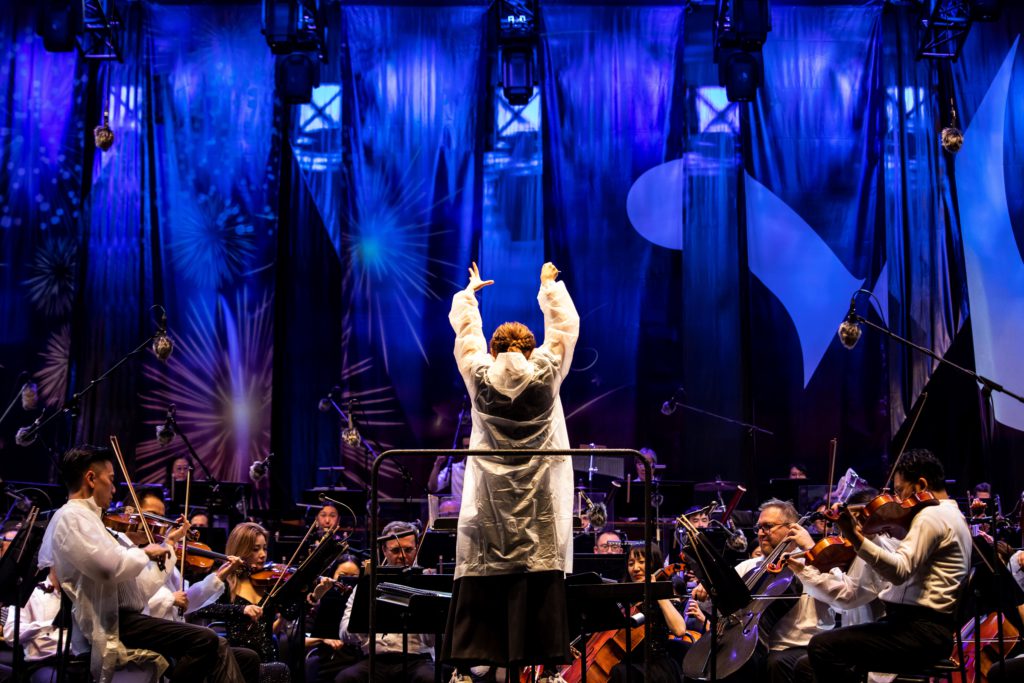Since her first brush with fame a decade ago, Hong Kong-born conductor Elim Chan has fought a “long-term battle” against tired assumptions about herself, music and how orchestras should be run.In 2014, Chan became the first woman to win themajor Donatella Flick Conducting Competition, kickstarting an international career that included a stint at the London Symphony Orchestra and opening this year’s BBC Proms, Britain’s top classical music festival.”I love to surprise people,” Chan, 38, told AFP in an interview ahead of guest-conducting the Hong Kong Philharmonicthis month.”When I started, people had super low expectations of me. They thought, yeah, a little Asian girl… what can she do?”Her rise reflects how the classical music world is being gradually reshaped by a new generation of conductors.Chan’s most recent gig — a five-year tenure as principal conductor at the Antwerp Symphony Orchestra that ended in May — left her convinced that musicians need new ways to engage audiences in an age of easy distractions.Many ensembles hit the reset button when the Covid pandemic ended, but Chan said they should “incorporate things that (they) have learnt, and not just completely go back to what has been”.Plenty of mistakes were made — including some early video productions that Chan admitted were “very bad” — but she said she would “keep pushing”.”An orchestra is one of these dinosaurs. It takes a long time for something to really stick.”- Hong Kong spirit -Raised in a middle-class Hong Kong family, Chan sang in her school choir and learnt instruments such as the cello, which she practised obsessively to the point of skipping meals.Local conductor Yip Wing-sie was an early inspiration, showing her women could stand at the head of an orchestra.But Chan did not seriously consider a conductor’s career until her undergraduate years at Smith College, a liberal arts college in the United States.”I was (making) excuses for myself to not do music for a while, because I also wanted to be like my friends… But then music has its way (of) showing up in my life,” she said.Now living in Amsterdam, Chan still feels connected to her home city, which came under Chinese rule shortly after she turned 10.”I am proud of the fact that there is actually this thing called a ‘Hongkonger’, a very cool hybrid quality, especially when we grew up in British colonial times,” she said.Switching to Cantonese, Chan said her working style was defined by a “can-do spirit” forged in Hong Kong’s hyper-competitive environment.”If something needs doing, I will do it well. If others aren’t doing their part, I’ll complete it for them,” Chan laughed.However, that quality has at times allowed people to take her for granted. Chan said she has got better at setting boundaries, which has helped her focus on a conductor’s core duty:”I have to stand up for the music. There are certain artistic qualities and priorities I have to fight for.”- ‘Tricky’ conversation -Since the beginning, Chan’s career has been tied to a wider discourse about women breaking into a male-dominated field — but she still finds that topic a “struggle”.”I totally support (women), but how do we do it? That’s the problem,” she said, adding orchestras are still figuring out ways to empower women and minority leaders.In the interview, she floated the idea of a possible orchestra for young girls, but also expressed ambivalence about La Maestra, a women-only conducting contest held in France.”After 10 years… I don’t need some sort of quota to say that we need to programme more women,” Chan said. “No, we get Elim because she is good.”More women are getting high-profile conducting jobs but with that comes greater scrutiny — including from unexpected sources.”As a woman conductor, actually the harshest critics are the women musicians… There’s a little bit of like, ‘Don’t mess it up for us’.”While tight-lipped about her next job, Chan said her upcoming projects included a foray into opera and shining a spotlight on Japanese composer Noriko Koide.The question was how a conductor — a job she described as a cross between “the biggest diplomat and the biggest cheerleader” — can rethink the relationship between orchestra and audience.Chan says she wants to build platforms to reach people outside the auditorium.”You look at the world now, we’re in a crazy time,” Chan said. “Just being on stage and having a good concert… For me, it’s not enough anymore.”
Fri, 22 Nov 2024 09:47:52 GMT









